Zihuai Zhao
WebRec: Enhancing LLM-based Recommendations with Attention-guided RAG from Web
Nov 18, 2025Abstract:Recommender systems play a vital role in alleviating information overload and enriching users' online experience. In the era of large language models (LLMs), LLM-based recommender systems have emerged as a prevalent paradigm for advancing personalized recommendations. Recently, retrieval-augmented generation (RAG) has drawn growing interest to facilitate the recommendation capability of LLMs, incorporating useful information retrieved from external knowledge bases. However, as a rich source of up-to-date information, the web remains under-explored by existing RAG-based recommendations. In particular, unique challenges are posed from two perspectives: one is to generate effective queries for web retrieval, considering the inherent knowledge gap between web search and recommendations; another challenge lies in harnessing online websites that contain substantial noisy content. To tackle these limitations, we propose WebRec, a novel web-based RAG framework, which takes advantage of the reasoning capability of LLMs to interpret recommendation tasks into queries of user preferences that cater to web retrieval. Moreover, given noisy web-retrieved information, where relevant pieces of evidence are scattered far apart, an insightful MP-Head is designed to enhance LLM attentions between distant tokens of relevant information via message passing. Extensive experiments have been conducted to demonstrate the effectiveness of our proposed web-based RAG methods in recommendation scenarios.
Investigating and Mitigating Stereotype-aware Unfairness in LLM-based Recommendations
Apr 05, 2025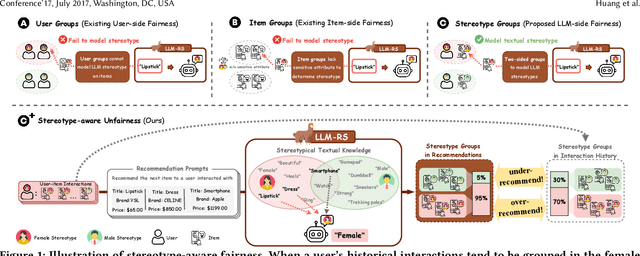

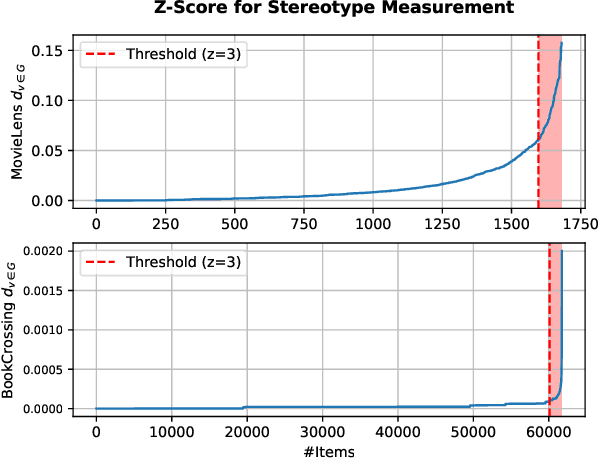

Abstract:Large Language Models (LLMs) have demonstrated unprecedented language understanding and reasoning capabilities to capture diverse user preferences and advance personalized recommendations. Despite the growing interest in LLM-based personalized recommendations, unique challenges are brought to the trustworthiness of LLM-based recommender systems (LLM-RS), since LLMs are likely to inherit stereotypes that are embedded ubiquitously in word embeddings due to their training on large-scale uncurated datasets. This leads to LLM-RS exhibiting stereotypical linguistic associations between users and items. However, there remains a lack of studies investigating the simultaneous existence of stereotypes between users and items in LLM-RS. To bridge this gap, this study reveals a new variant of fairness between stereotype groups containing both users and items, to quantify discrimination against stereotypes in LLM-RS. Moreover, in this paper, to mitigate stereotype-aware unfairness in textual user and item information, we propose a novel framework (MoS), in which an insightful stereotype-wise routing strategy over multiple stereotype-relevant experts is designed to learn unbiased representations against different stereotypes in LLM- RS. Extensive experiments are conducted to analyze the influence of stereotype-aware fairness in LLM-RS and the effectiveness of our proposed methods, which consistently outperform competitive benchmarks under various fairness settings.
TokenRec: Learning to Tokenize ID for LLM-based Generative Recommendation
Jun 15, 2024



Abstract:There is a growing interest in utilizing large-scale language models (LLMs) to advance next-generation Recommender Systems (RecSys), driven by their outstanding language understanding and in-context learning capabilities. In this scenario, tokenizing (i.e., indexing) users and items becomes essential for ensuring a seamless alignment of LLMs with recommendations. While several studies have made progress in representing users and items through textual contents or latent representations, challenges remain in efficiently capturing high-order collaborative knowledge into discrete tokens that are compatible with LLMs. Additionally, the majority of existing tokenization approaches often face difficulties in generalizing effectively to new/unseen users or items that were not in the training corpus. To address these challenges, we propose a novel framework called TokenRec, which introduces not only an effective ID tokenization strategy but also an efficient retrieval paradigm for LLM-based recommendations. Specifically, our tokenization strategy, Masked Vector-Quantized (MQ) Tokenizer, involves quantizing the masked user/item representations learned from collaborative filtering into discrete tokens, thus achieving a smooth incorporation of high-order collaborative knowledge and a generalizable tokenization of users and items for LLM-based RecSys. Meanwhile, our generative retrieval paradigm is designed to efficiently recommend top-$K$ items for users to eliminate the need for the time-consuming auto-regressive decoding and beam search processes used by LLMs, thus significantly reducing inference time. Comprehensive experiments validate the effectiveness of the proposed methods, demonstrating that TokenRec outperforms competitive benchmarks, including both traditional recommender systems and emerging LLM-based recommender systems.
Recommender Systems in the Era of Large Language Models
Jul 05, 2023Abstract:With the prosperity of e-commerce and web applications, Recommender Systems (RecSys) have become an important component of our daily life, providing personalized suggestions that cater to user preferences. While Deep Neural Networks (DNNs) have made significant advancements in enhancing recommender systems by modeling user-item interactions and incorporating textual side information, DNN-based methods still face limitations, such as difficulties in understanding users' interests and capturing textual side information, inabilities in generalizing to various recommendation scenarios and reasoning on their predictions, etc. Meanwhile, the emergence of Large Language Models (LLMs), such as ChatGPT and GPT4, has revolutionized the fields of Natural Language Processing (NLP) and Artificial Intelligence (AI), due to their remarkable abilities in fundamental responsibilities of language understanding and generation, as well as impressive generalization and reasoning capabilities. As a result, recent studies have attempted to harness the power of LLMs to enhance recommender systems. Given the rapid evolution of this research direction in recommender systems, there is a pressing need for a systematic overview that summarizes existing LLM-empowered recommender systems, to provide researchers in relevant fields with an in-depth understanding. Therefore, in this paper, we conduct a comprehensive review of LLM-empowered recommender systems from various aspects including Pre-training, Fine-tuning, and Prompting. More specifically, we first introduce representative methods to harness the power of LLMs (as a feature encoder) for learning representations of users and items. Then, we review recent techniques of LLMs for enhancing recommender systems from three paradigms, namely pre-training, fine-tuning, and prompting. Finally, we comprehensively discuss future directions in this emerging field.
Deep Learning for Wireless Networked Systems: a joint Estimation-Control-Scheduling Approach
Oct 03, 2022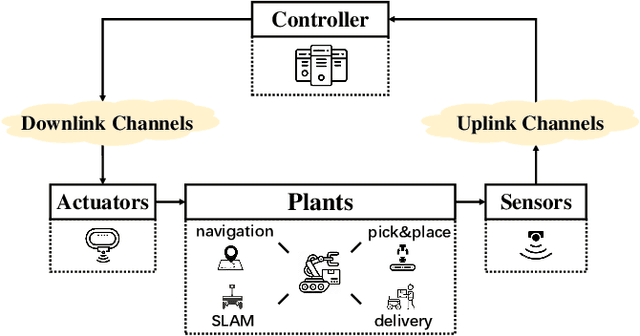
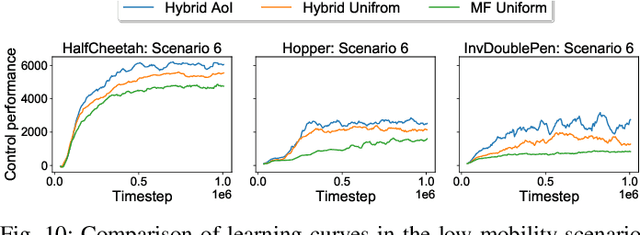
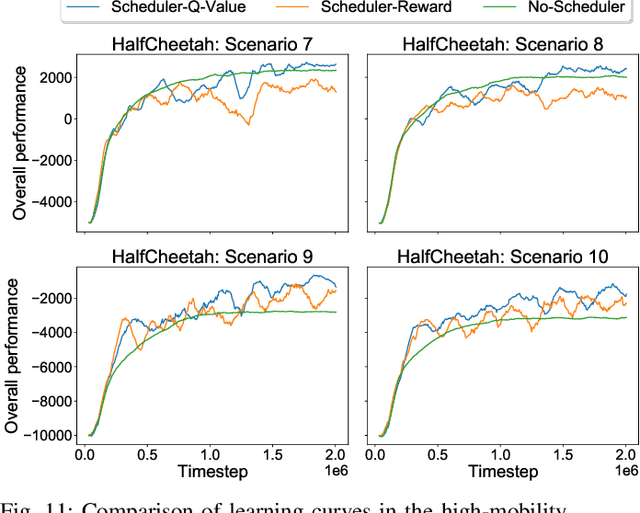
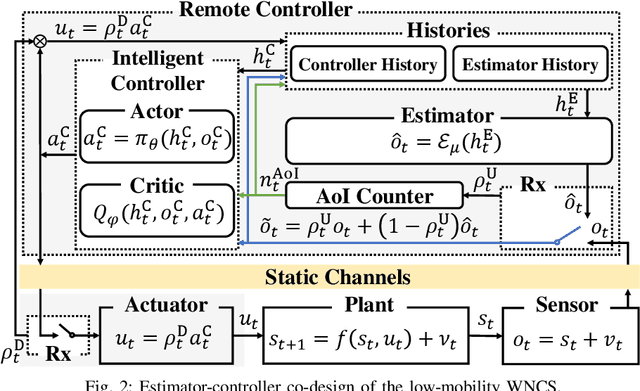
Abstract:Wireless networked control system (WNCS) connecting sensors, controllers, and actuators via wireless communications is a key enabling technology for highly scalable and low-cost deployment of control systems in the Industry 4.0 era. Despite the tight interaction of control and communications in WNCSs, most existing works adopt separative design approaches. This is mainly because the co-design of control-communication policies requires large and hybrid state and action spaces, making the optimal problem mathematically intractable and difficult to be solved effectively by classic algorithms. In this paper, we systematically investigate deep learning (DL)-based estimator-control-scheduler co-design for a model-unknown nonlinear WNCS over wireless fading channels. In particular, we propose a co-design framework with the awareness of the sensor's age-of-information (AoI) states and dynamic channel states. We propose a novel deep reinforcement learning (DRL)-based algorithm for controller and scheduler optimization utilizing both model-free and model-based data. An AoI-based importance sampling algorithm that takes into account the data accuracy is proposed for enhancing learning efficiency. We also develop novel schemes for enhancing the stability of joint training. Extensive experiments demonstrate that the proposed joint training algorithm can effectively solve the estimation-control-scheduling co-design problem in various scenarios and provide significant performance gain compared to separative design and some benchmark policies.
 Add to Chrome
Add to Chrome Add to Firefox
Add to Firefox Add to Edge
Add to Edge